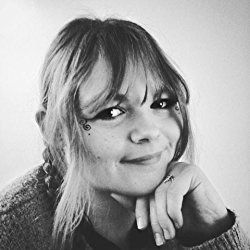 E.C. Hibbs is a fantasy/paranormal author and artist from north-west England. Her books include Blindsighted Wanderer, The Tragic Silence Series – Tragic Silence, The Libelle Papers and Sepia and Silver – The Sailorman’s Daughters, three anthologies – Night Journeys, Blood and Scales and Dare to Shine – plus non-fiction titles including The Fantasy Blueprint and The Short Story Blueprint. You can check out the book trailer for Blindsighted Wanderer here.
E.C. Hibbs is a fantasy/paranormal author and artist from north-west England. Her books include Blindsighted Wanderer, The Tragic Silence Series – Tragic Silence, The Libelle Papers and Sepia and Silver – The Sailorman’s Daughters, three anthologies – Night Journeys, Blood and Scales and Dare to Shine – plus non-fiction titles including The Fantasy Blueprint and The Short Story Blueprint. You can check out the book trailer for Blindsighted Wanderer here.
She also runs Elphame Arts, where she creates unique portraits in both digital fantasy and graphite mediums, as well as book and CD covers, and she produces a video series to help other writers, which you can check out here. She has a Bachelor of Science in Animal Behaviour, and a Postgraduate Diploma in Wildlife Conservation from the University of Chester in the UK. Besides writing, she reads obsessively, from the classics to all kinds of fantasy, and she loves watching Disney and horror films, practising Shotokan karate, archery, hiking up mountains, and playing with her cheeky cat Millie-Moo.
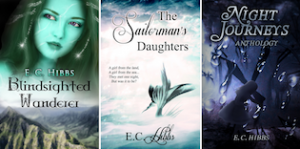 When did you start writing?
When did you start writing?
I’ve been writing ever since I can remember, but I moved onto novels seriously when I was in my early teens. I was a real loner during my first few years of high school, so I spent my lunchtimes in a corner of the library working on stories. I wrote six novels that way – and one of them eventually became my MIPA Award-nominated debut Blindsighted Wanderer.
How do you describe your books?
This is difficult for me to say exactly, because no two are the same! They each fall under YA fantasy as an umbrella term, but they’re all different. The last couple of stories I wrote couldn’t have been further apart – one was a gritty steampunk novel inspired by alchemy and 18th century Europe, and the second was an Arctic adventure with spirits and shamanism. I kind of like how they’re hard to define though – it keeps me on my toes!
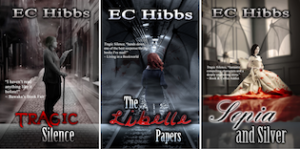 What draws you to the genre you write?
What draws you to the genre you write?
I’m happy to tackle practically anything so long as there’s some kind of fantasy or paranormal element involved. I feel fantasy is the greatest genre for offering true escapism, and for letting magic live. I love bringing that into the world.
What fuels your writing?
I’m really inspired by history, culture, and philosophies from all over the world. I’ve always been an avid reader of fairy tales and folklore, and I love to learn about practically everything. A lot of my stories have some kind of influence from those areas, but it’s often very subtle in the final book. Something else which really fuels me are my dreams – I’ve always had a crazy imagination which never shuts off, and I find some of my best story ideas come to me in my sleep.
Plotter or pantser?
I’m in the middle. I used to be a complete pantser, but as I progressed as a writer, I found the structure of my stories was suffering. So now I do a lot of pre-work before I begin the story, researching and experiencing as much as I can, and use that to write the basics in a chapter-by-chapter walkthrough. That’s the plotter side of me. But once that’s done and I’ve laid out a path for myself, I can be a lot more organic and pantsy with the actual writing!
Early bird or night owl?
Night owl! Evening is my favourite time of day and when I feel most awake. I have to be careful as I can easily work on a story until past 1am! I can get up and focus in the mornings, but that’s because I’ve trained myself to do it rather than it coming naturally!
Which of your published stories will always hold a place in your heart?
Blindsighted Wanderer. It was my first published novel, it was nominated for a MIPA Award, and it received widespread critical acclaim. I also got the offer of publication for it on the same day I found out I’d passed my Bachelor of Science university degree!
Which of your books would you most like to see made into a movie?
Probably Blindsighted Wanderer or The Sailorman’s Daughters. I think they would be really interesting to see visually!
Who do you like to read? Do you feel they influence you?
I love anything by Michelle Paver and Marcus Sedgwick, and I think they are probably the two authors who have influenced me the most in a broad sense. They both cover different time periods and countries, and their stories are never carbon copies of what they have previously done. I really admire authors who do that and push the envelope with their work, and it’s helped inspire me to do the same.
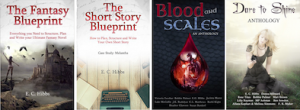 How do you continue to learn and develop your creative skills?
How do you continue to learn and develop your creative skills?
Because I don’t just stick to one type of story, I like to think that every new novel is a learning experience. Each one presents new challenges and demands something different of me. I’m also quite self-critical and can be brutal with my own work when I have to edit it. So even though it’s hard to butcher a story, the improvements it can bring are worth it – not just for that story, but for me going forward.
You’re also an artist – does that feed into your writing? I imagine they inspire each other…
They certainly do! Fantasy is also my favourite thing to create in my art, and in the last few years I’ve also worked on my graphic design skills. In the last few years I’ve designed all my own book covers, promo materials and graphics, and I do it for other authors too.
How attached do you get to your characters?
I get very attached to them – I spend a lot of time getting to know them and figuring out their psychologies before I even begin writing. It’s not uncommon for me to spend years thinking about them. If I don’t feel they are real, and I am not completely immersed in their story and world, I know something’s not right. I suppose it’s a bit like method-acting, but on the page!
Who is your biggest supporter?
Without a doubt, my friend Rhian. She has been there for me since the very beginning and had my back no matter what I’ve gone through. She even modelled for the cover artwork for Tragic Silence! She’s an amazing friend and my number one Batty. And my mum is a huge supporter too – she’s always the first person to read my stories and gives me a brutally honest opinion so I can improve them.
What is your biggest fear as a writer?
Unfortunately it’s something I have to face quite often: not being taken seriously. I’ve met a lot of people and institutions who ignore or look down on authors who have any kind of indie background, especially where I am in the UK. So that makes it very difficult to get support or even take part in live events. I’m hoping that will change in the future.
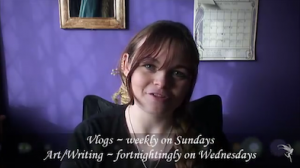 What’s next for you writing wise?
What’s next for you writing wise?
I’m in-between agents right now so I won’t be releasing any more novels for the time being, but I’m in the process of working on a course called One Novel, One Month. It’s due for launch in February next year and will reveal all my tips and tricks.
Find out more about E.C. Hibbs at her website.
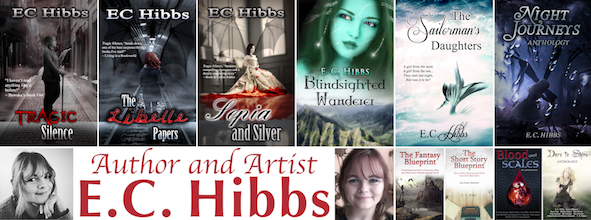
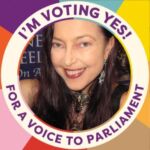

Get Social